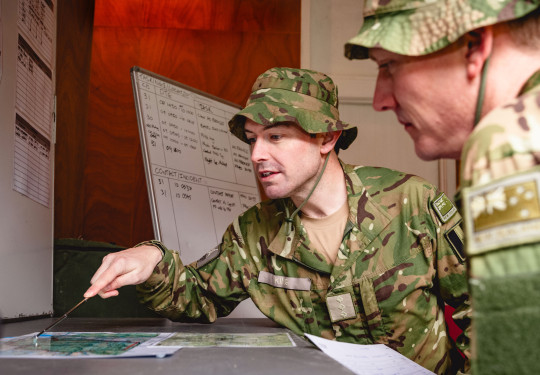Military training pays dividend in court room from Hamilton
When Captain Fraser King joined the New Zealand Army Reserve Force in 2005 he didn’t expect his Army training, which has included planning to quell a theoretical armed rebellion in Taranaki, would have such a positive impact on his civilian career.
07 November, 2023
Captain King is a partner in Hamilton-based civil litigation law firm McKenna King Dempster, where he says the military has given him “the tools to navigate complex problems to achieve the best outcome under often demanding conditions”.
“Generally my approach to a case, and achieving a successful outcome, is largely applying the military processes, leadership and problem-solving techniques that I’ve learnt in the Army,” he said.
That includes challenges such as dealing with an insurgency breaking out across the neighbouring province of Taranaki, which was one scenario on a 16-day course he recently attended through the New Zealand Army.
Captain King, as Officer Commanding, Hauraki Company, is normally in charge of 60 personnel, their vehicles and equipment.
However, the course put him in theoretical charge of up to 3500 personnel. He and his team developed options for responding to the insurgents while integrating local fledgling security forces, balancing tribal relations and reassuring locals of their safety.
They also had to deliver essential services and protect key infrastructure, alongside practical details such as ensuring enough equipment, food, and fuel was available.
Knowing both his own and the team’s strengths and weaknesses, and having the ability to communicate clearly to superiors and subordinates, was paramount, he said.
In the field, he had to have a good understanding of both situational and spatial awareness in order to translate map-to-ground scenarios, and to translate information coming from his platoon commanders and company sergeant.
“We are consistently challenged and encouraged to learn throughout our Army careers, and this has significantly and positively assisted my civilian career as a litigation lawyer over the last 15 years,” Captain King said.
“One of the skills I’ve learnt is how to efficiently and pragmatically assess strengths and weaknesses of the opposition case in a courtroom environment, and more importantly, I am aware of my own strengths and weaknesses and how I manage these in a high pressure environment.
“I have also adapted a tailored methodology to my litigation process for cases that are proceeding to trial, which has evolved from the learnings of my military training,” he said.
“If aspiring litigators were aware of the benefits of military training, I think many of them would enlist.”
Since joining the Reserve Force, Captain King has also assisted with the response to Covid-19, and National Civil Defence emergencies including the Christchurch earthquakes, Cyclone Debbie in Edgecombe, and Cyclone Gabrielle in Coromandel where he was the liaison officer in the Civil Defence office.
Any Defence Recruiting enquiries can be directed to 0800 1 FORCE. Each Reserve Force company has its own training programme in line with its battalion’s training focus. Company level training typically takes place one weekend a month, with platoon level training held one night a week.
